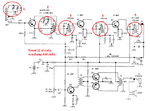- Joined
- Jul 4, 2009
- Messages
- 16,235
- Helped
- 5,140
- Reputation
- 10,309
- Reaction score
- 5,120
- Trophy points
- 1,393
- Location
- Aberdyfi, West Wales, UK
- Activity points
- 137,397
Thats a method of finding average voltage values in different ways, it has nothing to do with your cell phone detector.
All the schematics so far are either wrong and wont work at all (post #17) or are nothing more than wide spectrum electrostatic/electromagnetic detectors. To do the job correctly you need to follow the advice already given. It involves RF circuitry, not op-amps. If I place my cell phone on top of my stereo amplifier, it makes a noise but that doesn't make the stereo a phone detector.
Brian.
All the schematics so far are either wrong and wont work at all (post #17) or are nothing more than wide spectrum electrostatic/electromagnetic detectors. To do the job correctly you need to follow the advice already given. It involves RF circuitry, not op-amps. If I place my cell phone on top of my stereo amplifier, it makes a noise but that doesn't make the stereo a phone detector.
Brian.

